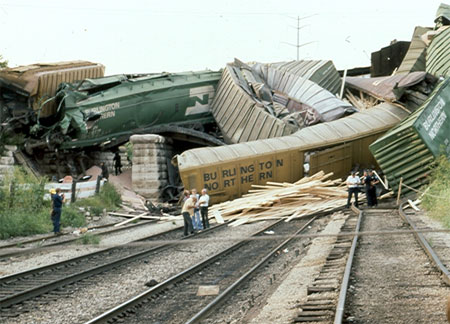
The question thus arises, what is to be done with the train wreck that is the American economy?
One approach that has become popular is to write about it. There is a land office business these days in gloom and doom. Its practitioners are now so numerous it's pointless to list them all. Those who become prominent have made a business out of bad news. That is, after all, the American way - maybe the economy is coming apart at the seams, but how can I, personally, make some money out of this deal? There are hundreds of books on the subject, many websites, thousands of blogs. Not all are venally motivated; some, after all, are exercises in pure Schadenfreude, others are the psychological working-through of chronic depressives.
Here at the pond, I must say that I'm clearly not in it for the money. Nor do I consider myself a chronic depressive, and it's bad form to revel too much in misfortune. It's not even in good taste, in fact. I do find it interesting, that's all. It's interesting to understand the reality of a given society and polity. That's what Thoreau was into - how does this whole situation work? Why do people behave the way they do?
One thing I think we can say without being gainsaid (successfully) is that for something around forty years, American society has been on a downward trajectory. That's old news at this point, but certain parameters bear the judgment out. As one example, the breathless analysts at outlets like CNBC and Bloomberg, whose relevance depends on the relevance of the thing they're selling, the ups and downs of the stock market, don't often point out that the S&P 500 and the Dow are at virtually the same level now that they were in 1998; however, there has been at least 25% inflation during that period, so to adjust for constant dollars, one would have to put the S&P in the 750-800 range instead of its nominal 1,100 or so, and the Dow at 7,500, instead of just north of 10,000. So why don't the stock pundits talk about this? It's obviously the reason that Wall Street got into the casino business. Churning the market and creating exotic betting vehicles were the only way to make money once the traditional retail trade dried up and "buy and hold" took its place among our durable illusions.
And then, of course, the illusion-bordering-on-delusion of the globalization movement. Americans are so gullible and so poorly educated about what is in their own best interest that they listened to functional idiots like Tom Friedman of the New York Times, whose only expertise, so far as I can discern, is in clumsy writing. Or Paul Krugman, another Times-sponsored propagandist, who doesn't talk a lot about the fact his Nobel was won for work he did on "patterns of international trade," back in the go-go 1990's, when NAFTA was signed and Perot heard that giant sucking sound of American jobs heading South O' the Border and to Asia. Look, how obvious can something be? If you're the top economic dog, paying high salaries for value added work such as manufacturing complex products like automobiles and electronics, how is it going to benefit the mass populace if you ship all those jobs overseas where the work is performed for pennies on the dollar, and relegate yourselves to retailing and importing the stuff you used to make? Won't water seek its own level? You might ask, well isn't such a process inevitable? No, of course it isn't. Someone not in the thrall of American-based multinational corporations increasing their profit margins by using cheap labor (completely free of environmental considerations) would see what was going on and bring home the reality that the economy needed to be restructured, less on consumerism, more on essential value-added manufacturing, small-scale farming and ecological balance. Essentially, a post-growth economy. The United States has the resources to accomplish this. The crisis in the United States was an act of slow-motion economic suicide.
Well, we don't have central planning, in any rational sense. The current takeover by the federal government of what's left of American industry and finance is simply a salvage operation to keep the game afloat for a little while longer. Bernanke & Co. are attempting to maneuver the American economy into a glide path leading to the softest possible crash landing. There is wisdom in this, as Dmitry Orlov has written. If you ease your way down, then when the final collapse comes it will be more like falling out of a ground floor window than from 85 stories up.


No comments:
Post a Comment